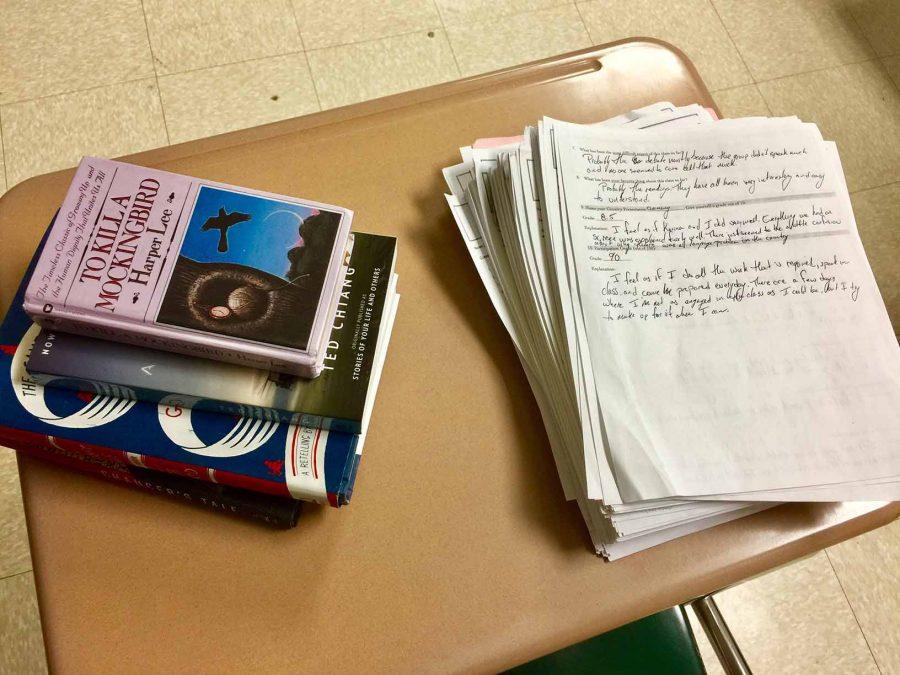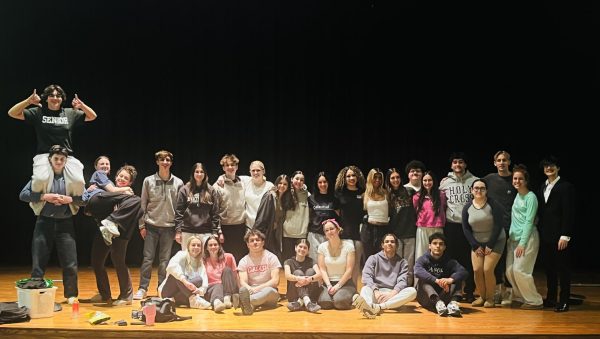Homework: Dartmouth School District re-examines a cornerstone of modern education
High school students across the country spend roughly seven hours a day in school. Within this timeframe, essays, worksheets, and readings are assigned to be completed at home. When homework is added on to after-school activities, such as club meetings, band, sports practices, or work, it can consume a large portion of a student’s time. This overload of responsibilities results in heightened stress levels and a lack of leisure time.
According to Dr. Harris Cooper, a professor of education and psychology at Duke University, the ideal amount of time that high school students should spend doing homework is 1.5 to 2.5 hours.
In contrast to that remark, sophomore Sarah Sughrue said she spends three to four hours completing homework on the average night. “[It] adds a lot of unnecessary stress to my life. Not only do I have to actually find time to do it, but I have to plan ahead for what I’m going to do for the rest of my day, which takes a lot of extra energy,” she said. “It’s so hard to do sports and be a good student and sleep and do homework.”
Many other DHS students struggle with the same difficulties. Junior Caroline Mello believed that homework was necessary, but in limited amounts. “I enjoy sleep and homework doesn’t allow for that,” she said. “It’s hard to get everything done, because teachers don’t really understand that you have other classes that also give a lot of homework, and it all adds up.”
Senior Sonya Wilkinson agreed. “I have four different classes with four different assignments, four different projects, and four different tests and quizzes. It’s stressful,” she said. “We never get a break. You’re at school, and then you go home, but it’s still like school because of all your homework.”
According to Dr. Cooper, homework greatly increases student achievement. However, he also showed that an overabundance of homework can have the opposite effect and is not associated with higher grades. Homework, when assigned with a purpose, not just to keep students busy, can be extremely beneficial. It can be a crucial tool to reinforce what was taught in class and apply what students learned.
Sophomore Nina Lamarre found that homework better prepared her for assessments. “Homework is a big part of studying for me,” she said. “I use past homework assignments to determine what might be on the test and to review information. Without homework, I think students would generally do worse on tests because of a lack of preparation or practice.”
Algebra Teacher Marcia Viera voiced a similar opinion. She said, “I think one of the most important things to give in math is homework, so students can practice it before an assessment.”
While Superintendent Dr. Bonny Gifford acknowledges the significance of homework, she also believes that it can negatively impact students’ mental health. In an effort to remedy the issue, she has implemented a new homework policy.
This new policy states that homework is not allowed to be assigned during Thanksgiving break, and December, February, and April vacations. Dr. Gifford reasoned that homework prevented students from truly being able to relax while on vacation. “It’s a disruption to family time, a disruption to down time and recharging your batteries time,” she said.
Numerous parents emailed her about the difficulties their child faced when attempting to do their homework on vacation. “They happened to go away, and they were trying to get their student to do homework on a cruise ship and so they had to get WiFi, have computer access, create a research project,” she said. “You know, you’re going to the Caribbean. Who wants to do all that? One person even said that they lost their book on the ship, and they had to go buy a new one.” Stories such as this brought about the realization that this was an issue she needed to address.
However, a lot of teachers have expressed concerns as to how this will affect their curriculum. “We know that this will cause a little stress for some teachers because they do have a lot to cover, so we’re hoping that with some support they can manipulate their lessons and have the students hopefully learn a little more strategically,” Dr. Gifford said.
English Teacher Jessica Lassey sees the pros and cons of the issue. “I absolutely understand that students need a mental time out,” she said, “but I sympathize with teachers who struggle to fit the entire curriculum into the semester as it is. AP teachers especially.” Oftentimes teachers will assign students a project or other lengthy assignment to be completed over vacation. Now they must readjust their plans and squeeze the lesson in elsewhere.
Overall, the response from students has been very positive. Junior Jadyn Gonsalves appreciated the increase of leisure time. “Not having homework over vacation allows us to spend time with family and friends instead of worrying about doing work,” she said.
Her sentiments were echoed by sophomore Quintin Sheerin who said, “During vacations students should be able to relax and have a good time. It’s not a time to do school work.”









